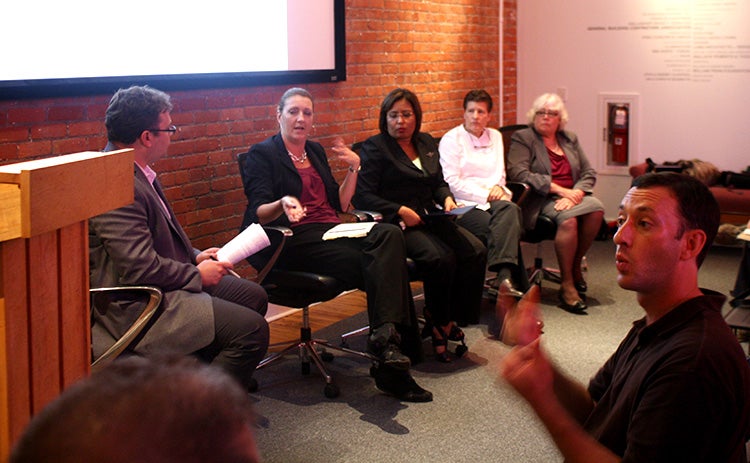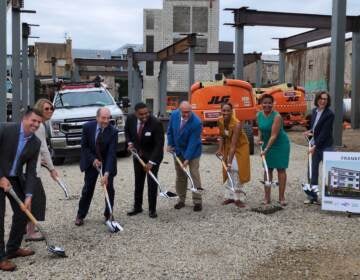Public officials, private citizens discuss vacant land reform in second Behind PlanPhilly event

Philadelphians concerned about the City’s oversupply of unused, vacant, and tax-delinquent land gathered at the Center for Architecture Tuesday night to discuss legislative solutions.
A panel—including Property Commissioner Bridget Collins-Greenwald, Councilwoman Maria Quiñones-Sánchez, Building Industry Association Vice President Anne Fadullon, and NKCDC director Sandy Salzman—talked through the Nutter Administration’s new “Front Door” policy and Councilwoman Sánchez’s Land Bank bill.
The discussion was moderated by Patrick Kerkstra, a freelance reporter who has written about tax-delinquency for PlanPhilly and The Philadelphia Inquirer.
The panelists agreed that recent initiatives to dispose of City-owned vacant land and crack down on private vacant-property owners are steps in the right direction, but that much more needs to be done—and more strategically—to address the scope of the problem. Various City agencies own an estimated 10,000 vacant properties, with another 30,000 in the hands of private owners.
As Kerkstra reported earlier this week, property tax debt owed to the city increased by more than $40 million last year; delinquents now owe Philadelphia more than half a billion dollars in all. Councilwoman Sánchez took issue with the figure, saying that most of the debt is “fake,” in the sense that the City will never be able to collect it all. She said the City needs to enact policies which get this debt off the books—either through repayment or debt forgiveness—and put vacant parcels back into productive use.
She said an effective Land Bank would help identify debt that is practically collectible and pursue other options for disposing vacant parcels on which the City is unlikely to collect the bills it’s owed.
Both Sánchez and Collins-Greenwald admitted that neither the Front Door nor the Land Bank does anything to change the practice of “councilmanic privilege,” in which Council tends to unanimously support District Councilmembers’ proposals for their own districts, giving those members de facto veto power over local development. During the discussion, Councilwoman Sánchez framed that privilege as a positive, saying it creates increased transparency by forcing developers to make a case for their projects. Though other Council members have defended the privilege on various grounds, almost no one else has.
Check out the whole discussion in the video that will be posted Wedesday.
Contact the reporter at jaredbrey@gmail.com
WHYY is your source for fact-based, in-depth journalism and information. As a nonprofit organization, we rely on financial support from readers like you. Please give today.





